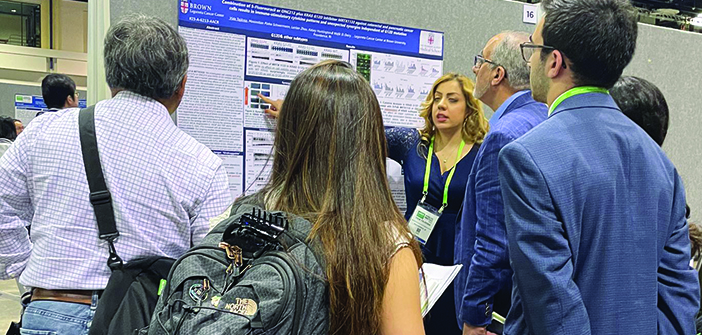Legorreta Cancer Center researchers had a presence at the AACR annual meeting in April.
Dozens of physician-scientists, postdoctoral fellows, and graduate and undergraduate student researchers representing Brown University’s Legorreta Cancer Center descended on Orlando, FL, in April to attend the 114th annual meeting of the American Association for Cancer Research.
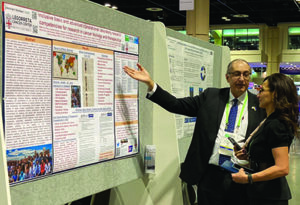
Wafik El-Deiry discusses his poster on inclusive research practices.
The six-day event, attended by more than 21,000 cancer researchers from around the world, featured 6,300 abstracts and more than 600 oral presentations. Of those, 65 came from the Legorreta Cancer Center, according to center director Wafik El-Deiry, MD, PhD.
“That’s roughly 1 percent, give or take,” says El-Deiry, the Mencoff Family University Professor of Medical Science. “This is from Little Rhody. We had a presence at the meeting.”
They also hosted the second annual Legorreta Cancer Center reception at the AACR meeting, which El-Deiry says was attended by the leadership of the American Cancer Society, researchers from Ukraine’s National Cancer Institute, and friends and colleagues from around the US and the world.
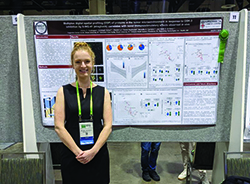
Kelsey Huntington PhD’25 earned a Scholar-in-Training Award for her dissertation research.
Other highlights for El-Deiry included the many opportunities to network, compare notes with other cancer center directors, and meet luminaries like Nobel Prize laureates Carolyn Bertozzi, PhD, and James P. Allison, PhD.
Most of all, the AACR meeting was about the research. “There was great science presented. I tried very hard to get to most of the presentations from our institution,” El-Deiry says. “You need running shoes.”
Legorreta Cancer Center members shared findings on a breadth of topics that demonstrate the wide reach of the basic and clinical research happening at Brown. They included trials that may expand the therapeutic potential of existing drugs for other cancers; the discovery of a small molecule that promotes immune killing of colorectal tumor cells; and a potential strategy to prevent a radiation-induced lung injury called pneumonitis.
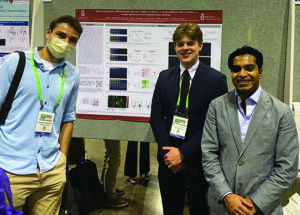
William MacDonald ’23, center, was among several undergraduate researchers from Brown.
El-Deiry highlighted the work of the many students who attended the annual meeting, noting their impact on the field. “I had a career high in terms of presentations at this meeting, and part of it has to do with the amazing undergraduates we have at Brown University,” he says.
He even presented a poster, “about how we train students and fellows at different levels as they come to do cancer research, and how this is truly inclusive by bringing everyone up to speed as quickly as possible for how to do cancer research in 2023 and to make important contributions.” In fall 2022, El-Deiry had 17 undergraduates in his lab, in addition to medical, graduate, and even high school students.
For students able to go to Orlando last month, “it’s quite an impactful experience on them in many ways—to just see everything that goes on, to have people walk up to them and engage them in conversations about their own work and potential collaborations,” El-Deiry says. “And I could see it in the students, how energized and excited they were to be there.”
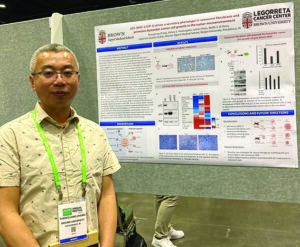
Assistant Professor of Pathology and Laboratory Medicine Shengliang Zhang’s research focuses on cancer drug development.
It brought him back to his own student days, when he was studying medicine at Johns Hopkins. “I attended my first AACR meeting in 1990,” he says. “I got to present a poster and be visited by professors and others walking the poster halls. I was certainly impressed back then by just how many people were working on cancer and how they all come together and exchange information and start new collaborations. Throughout my career, this has really been our big annual event.”
View the full list of AACR presentations by Legorreta Cancer Center researchers.

